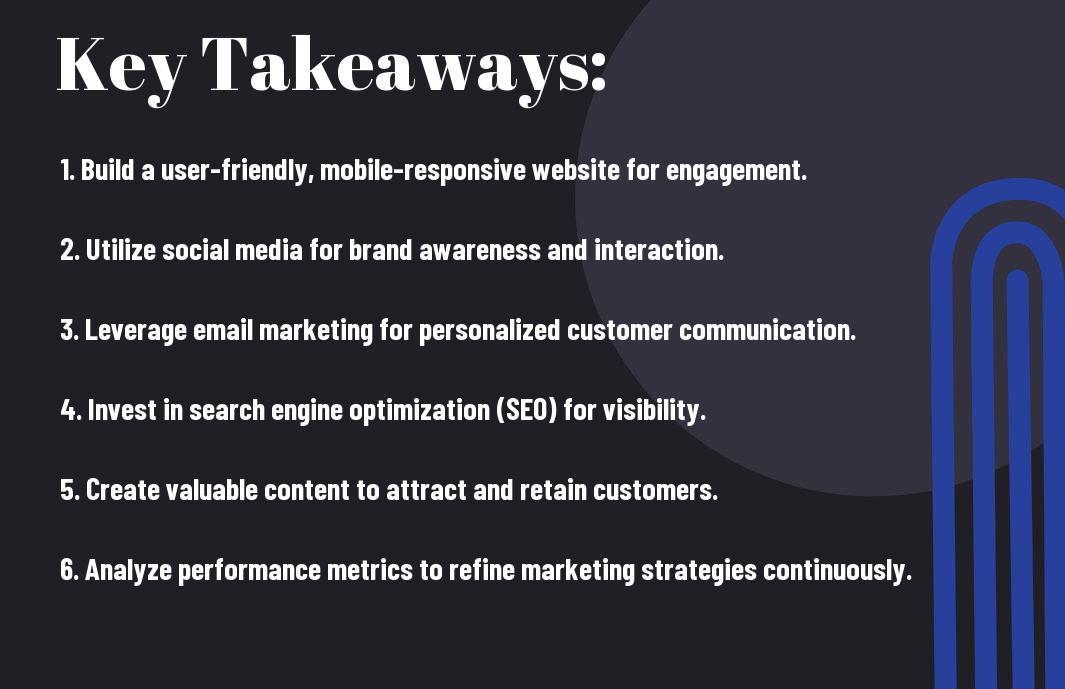Most small business owners understand that embracing digital marketing is crucial for survival in today’s competitive landscape. With the right strategies, you can enhance your online presence, attract more customers, and ultimately drive sales. This listicle will guide you through 10 imperative digital marketing strategies tailored specifically for small businesses like yours. By implementing these techniques, you can take control of your marketing efforts and set your business on the path to success and growth in the digital realm.
Social Media Engagement
Table Of Content
- Social Media Engagement
- Search Engine Optimization
- Email Marketing Campaigns
- Content Marketing Strategy
- Pay-Per-Click Advertising
- Influencer Partnerships
- Local SEO Optimization
- Mobile Optimization
- Customer Feedback Utilization
- Analytics and Tracking
- Final Words
- FAQ
- Q: What are the 10 imperative digital marketing strategies for small businesses?
- Q: How does SEO benefit small businesses?
- Q: Why is content marketing important for small businesses?
- Q: What role does social media play in digital marketing for small businesses?
- Q: How can small businesses effectively utilize email marketing?
- Q: What is the importance of web analytics for small businesses?
The power of social media engagement is crucial for small businesses aiming to build a strong online presence. By actively interacting with your audience, you can foster brand loyalty, increase customer trust, and drive traffic to your website. Engaging content not only elevates your brand’s visibility but also encourages conversations and community building, making your business more relatable and accessible to potential customers.
Choose Right Platforms
Even with countless social media options available, selecting the right platforms for your business is crucial to maximize your reach and engagement. Assess your target audience’s preferences and behaviors to determine where they spend their time online. Prioritize platforms that align with your brand’s goals and allow you to showcase your unique offerings effectively.
Create Interactive Content
Social media thrives on interaction, and creating engaging content is key to elevating your online presence. You can boost your audience’s involvement through polls, quizzes, contests, or live Q&A sessions, encouraging them to share their thoughts and experiences related to your brand. This not only strengthens relationships but also enhances customer engagement, resulting in potential repeat business and referrals.
Platforms like Instagram, Facebook, and Twitter offer various tools to create interactive content that resonates with your audience. By leveraging features such as polls, stories, or live videos, you invite your followers to participate actively. Additionally, providing incentives like discounts or giveaways for engaging with your content can create a sense of community around your brand. Do not forget, the more interactive and rewarding your content is, the more likely your audience will remain loyal and engaged.


Search Engine Optimization
Assuming you want your small business to stand out online, implementing effective Search Engine Optimization (SEO) strategies is crucial. SEO helps improve your website’s visibility on search engines, attracting more organic traffic. By optimizing various elements of your site, you can increase your chances of reaching your target audience and driving more conversions. Keep in mind, in the digital landscape, good SEO practices can make a significant difference in your business’s success.
Optimize Website Content
Optimize your website content by ensuring it is informative, engaging, and relevant to your target audience. This involves incorporating relevant topics, using headings effectively, and maintaining clear navigation. Aim to offer valuable insights that your potential customers are searching for, which can help enhance user experience and reduce bounce rates. By delivering optimized content, you increase the likelihood of visitors staying on your site longer, ultimately leading to greater brand loyalty.
Use Keywords Effectively
If you want to attract the right audience, using keywords effectively is vital. Research relevant keywords related to your business and seamlessly incorporate them into your content, meta descriptions, and headers. This not only helps search engines understand your content better but also improves your chances of ranking higher in search results.
This process involves carefully selecting high-volume keywords that reflect what your potential customers are searching for. However, it’s important to strike a balance; overstuffing keywords can lead to penalties from search engines. Focus on using long-tail keywords, as they are often less competitive and attract more qualified traffic. By understanding your audience’s search behavior and incrementally optimizing your keyword usage, you can enhance your SEO strategy and boost your website’s visibility effectively.
Email Marketing Campaigns
After establishing a strong online presence, leveraging email marketing campaigns is crucial for connecting with your audience. This strategy enables you to reach customers directly in their inbox, nurture leads, and foster loyalty. By crafting targeted and relevant content, you can drive traffic to your website while boosting conversions. Ultimately, effective email marketing can be a game-changer for your small business.
Build Email List
Now, start by building a robust email list to ensure the success of your campaigns. Use sign-up forms on your website, offer incentives such as discounts or exclusive content, and engage with your audience on social media to encourage subscriptions. A diverse and engaged email list is your best asset when it comes to promoting your products and services effectively.
Personalize Email Messages
While crafting your email campaigns, it’s necessary to personalize your messages for better engagement. By segmenting your audience based on interests, behaviors, and demographics, you can tailor your content to meet their specific needs and preferences, making them feel valued. Personalization helps in increasing open rates and driving conversions.
Email personalization not only improves engagement but also strengthens customer relationships. By addressing subscribers by their name and suggesting products or services based on prior interactions, you create a sense of familiarity. Personalized content can reduce the risk of unsubscribes and significantly boost your campaign’s ROI. Keep in mind, the more you know your audience, the better you can serve them, turning casual browsers into loyal customers.
Content Marketing Strategy
Now, understand that a strong content marketing strategy is necessary for your small business to thrive online. By creating and distributing valuable, relevant content, you can engage with your target audience, build trust, and drive conversions. This approach not only enhances brand awareness but also positions your business as an authority in your niche, ultimately leading to sustained growth and customer loyalty.
Create Valuable Content
Content that resonates with your audience is key to capturing their attention. Focus on crafting informative, entertaining, and engaging pieces that address their pain points, answer their questions, and provide solutions. Bear in mind, your content should not only showcase your products or services but also enrich the lives of your readers, making them more likely to interact with your brand.
Update Regularly
To maximize the effectiveness of your content marketing strategy, it’s crucial to keep your content fresh and relevant. Regular updates signal to both your audience and search engines that you’re active and engaged, which can boost your overall visibility and credibility. Aim for a consistent schedule that keeps your audience returning for more.
Update your content frequently to maintain engagement and improve your search engine rankings. Outdated information can lead to loss of trust and reduced traffic, while fresh content helps you stay ahead of competitors. Make it a point to assess and refresh your existing content, enhancing it with the latest industry trends, statistics, or insights. Additionally, consider incorporating new formats, such as videos or infographics, to keep your offerings dynamic. Bear in mind, regular updates not only enhance user experience but also improve your SEO performance and engagement rates.
Pay-Per-Click Advertising
For small businesses looking to gain visibility quickly, pay-per-click (PPC) advertising can be a game-changer. By investing in targeted ads, you can attract potential customers who are actively searching for your products or services. With platforms like Google Ads and social media networks, you can reach your audience effectively while only paying when someone clicks on your ad, maximizing your budget and improving your return on investment.
Target Specific Audience
The ability to target specific audiences is one of the key advantages of PPC advertising. You can customize your ads based on demographics, interests, location, and even online behaviors to ensure that your marketing message reaches those who are most likely to convert. This enhanced targeting helps you spend your advertising dollars wisely and increases the chances of attracting qualified leads to your business.
Monitor Ad Performance
There’s no need to guess whether your ads are effective when you can monitor ad performance in real-time. Utilizing analytics tools allows you to track necessary metrics such as click-through rates, conversion rates, and cost per acquisition. By regularly analyzing these data points, you can make informed adjustments to optimize your campaigns.
A key aspect of successful PPC campaigns is continuous optimization through performance monitoring. By analyzing different metrics, you can identify which ads are underperforming and make necessary adjustments, such as tweaking your ad copy, changing keywords, or refining your target audience. This proactive approach ensures you are not wasting money on ineffective ads and helps you focus on what drives results for your business. Maintaining flexibility in your strategy also allows you to capitalize on trending keywords or seasonal changes that might draw more traffic to your site.
Influencer Partnerships
Unlike traditional advertising, influencer partnerships allow you to connect with your target audience in a more authentic way. By collaborating with individuals who have established credibility and a loyal following, your small business can enhance its visibility and build trust with potential customers. This strategy not only amplifies your brand message but also fosters a community of engaged and interested consumers who are more likely to convert.
Collaborate with Influencers
With the right influencer collaboration, you can tap into their creative storytelling abilities to elevate your brand’s presence. Choosing influencers who resonate with your brand values can enhance your messaging and create powerful content that speaks directly to your audience. This partnership can take many forms, from sponsored posts to product reviews, helping to showcase your offerings in an authentic light.
Leverage Their Audience
Influencer partnerships offer a unique opportunity to reach a larger audience by aligning your brand with trusted names in your industry. Influencer endorsements can effectively sway their followers’ purchasing decisions and introduce your products or services to a pool of potential customers who might not have discovered you otherwise. By leveraging their audience, you can create a ripple effect that extends far beyond your normal reach.
Partnerships with influencers can be a game-changer for your business. By tapping into their established platforms, you gain access to a diverse and engaged audience that is already interested in similar products. However, be sure to choose influencers whose personal brand aligns with your values to avoid any negative backlash. Successful collaborations can lead to increased brand awareness, improved credibility, and direct traffic to your website, ultimately boosting your sales and driving growth.
Local SEO Optimization
Keep in mind that optimizing for local SEO is crucial for small businesses looking to attract customers in their vicinity. This strategy can significantly enhance your online visibility and drive foot traffic to your storefront. Ensure that your business appears in local search results by using effective practices tailored specifically to your geographic area.
Register on Google
An necessary step in optimizing for local SEO is to register your business on Google My Business. By claiming your listing, you provide important information about your business, such as address, contact details, and operating hours. This visibility on Google Maps and local search results not only builds credibility but also ensures that you connect with potential customers actively searching for services or products in your area.
Use Local Keywords
There’s a significant advantage to incorporating local keywords in your content strategy. Targeting phrases that include your city or neighborhood not only helps search engines understand where you operate but also aligns your business with local searches performed by customers in your area. This initiative can elevate your rankings in local search results and increase the likelihood of attracting customers who are looking for services just like yours.
Optimization of your content with local keywords dramatically improves your chances of being found by your community. By strategically placing geographical keywords in website content, meta descriptions, and blog posts, you inform search engines about your service area. This practice directly influences your visibility in local searches. Ensure that you conduct keyword research to identify relevant terms your customers are using, and don’t forget to monitor keyword performance. Recall, targeting the right local searches enables you to attract more qualified leads and build lasting connections with local customers.

Mobile Optimization
Once again, optimizing your website for mobile devices is crucial in today’s digital landscape. With a significant portion of online searches happening on smartphones, ensuring a seamless mobile experience can lead to increased traffic, higher engagement, and ultimately, more conversions. This includes adjusting your content to fit smaller screens and catering to the on-the-go consumer mindset. Neglecting mobile optimization could leave you behind your competitors who prioritize user experience across all devices.
Responsive Website Design
Assuming you want to retain your audience, implementing a responsive website design is a must. This approach allows your website to adapt seamlessly to various screen sizes, whether it’s a desktop, tablet, or smartphone. A responsive design enhances user experience, making navigation intuitive and pleasant. By providing an optimized view regardless of the device used, you ensure that visitors can easily engage with your content.
Fast Loading Speeds
Little do many business owners realize, but fast loading speeds are necessary for retaining visitors. If your website takes too long to load, you risk losing potential customers who may abandon your site in frustration. Aim for loading times of under three seconds; anything longer could lead to a drop in user satisfaction and site traffic.
With fast loading speeds, you not only enhance user experience but also boost your site’s search engine ranking. Factors such as optimized images, minimized code, and efficient hosting solutions play a significant role in achieving this speed. Be mindful of, if your website is sluggish, visitors are likely to perceive your brand as untrustworthy and may ultimately turn to competitors with faster load times. Prioritizing this aspect of mobile optimization is crucial in maintaining a strong online presence.
Customer Feedback Utilization
Many small businesses overlook the power of customer feedback, but utilizing it can significantly enhance your marketing strategy. By actively seeking out customer insights, you can gain valuable information that informs product improvements, refines your messaging, and ultimately leads to increased customer satisfaction. Listening to your customers fosters loyalty and encourages word-of-mouth referrals, propelling your business forward in a competitive landscape.
Collect Customer Reviews
You’ll want to make it easy for your customers to leave reviews on various platforms. Whether it’s through direct requests, follow-up emails, or incentivizing feedback with discounts, gathering customer reviews not only bolsters your online reputation but also provides you with a treasure trove of insights into your target audience’s preferences and experiences..
Act on Feedback
On the other hand, simply collecting feedback isn’t enough; you must also act on it. When you respond to customer comments and implement their suggestions, it shows customers that you value their opinions and are committed to improving. This engagement can turn negative experiences into positive ones, fostering a sense of community and trust.
Customer feedback is an invaluable resource that helps you enhance your offerings. By closely analyzing both positive and negative feedback, you can identify trends and areas that need improvement. Addressing issues swiftly not only mitigates potential damage to your reputation but also reveals your commitment to excellent service. Be mindful of, customers appreciate when you take their input seriously, which can transform their negative experiences into loyalty. Ultimately, acting on feedback can lead to better product development and a stronger connection with your audience.
Analytics and Tracking
To effectively grow your small business, you must prioritize analytics and tracking to gain insights into your digital marketing campaigns. By leveraging data, you can understand customer behavior, assess campaign performance, and identify areas for improvement. Employing the right tools will help you make informed decisions that align with your business goals.
Monitor Website Traffic
There’s a wealth of information available through monitoring your website traffic. By analyzing metrics such as the number of visitors, bounce rates, and user engagement, you can gain a better understanding of how users interact with your site. Tools like Google Analytics can provide these insights, enabling you to optimize content and enhance the user experience.
Adjust Strategies Accordingly
On a regular basis, it’s crucial to adjust your strategies based on the insights gathered. Staying flexible allows you to respond to trends and shifts in customer behavior, ensuring your marketing efforts remain effective and relevant. This iterative approach not only helps you stay competitive but also fosters ongoing improvement in your campaigns.
A solid adjustment plan allows you to capitalize on emerging opportunities while mitigating any negative trends identified through your analytics. By actively analyzing performance data, you can identify which marketing tactics are yielding positive results, and aggressively promote those initiatives. Conversely, any strategies that aren’t performing well should be re-evaluated or paused. This proactive approach will help you maximize your return on investment and achieve your business objectives more effectively.
Final Words
Presently, implementing these 10 important digital marketing strategies can significantly elevate your small business’s online presence. By leveraging the power of SEO, social media, email marketing, and content creation, you can connect more effectively with your target audience. Remember to analyze your results continually and adapt your approach as needed to stay competitive. By investing time and effort into these strategies, you’ll not only enhance your visibility but also foster lasting relationships with customers, ultimately driving growth and success for your business.
FAQ
Q: What are the 10 imperative digital marketing strategies for small businesses?
A: The 10 imperative digital marketing strategies for small businesses include:
- 1. Search Engine Optimization (SEO)
- 2. Content Marketing
- 3. Social Media Marketing
- 4. Email Marketing
- 5. Pay-Per-Click Advertising (PPC)
- 6. Affiliate Marketing
- 7. Influencer Marketing
- 8. Local SEO
- 9. Web Analytics
- 10. Mobile Marketing
Q: How does SEO benefit small businesses?
A: SEO helps small businesses increase their visibility in search engine results, making it easier for potential customers to find them. By optimizing their website with relevant keywords, improving site speed, and creating quality content, small businesses can attract more organic traffic, which can lead to higher conversion rates and ultimately increased sales.
Q: Why is content marketing important for small businesses?
A: Content marketing builds trust and authority in a brand by providing valuable, informative content that addresses the needs and interests of the target audience. It can include blog posts, videos, infographics, and ebooks. By regularly creating and sharing engaging content, small businesses can enhance their brand reputation, improve customer loyalty, and attract new customers through organic search traffic.
A: Social media marketing allows small businesses to engage directly with their audience, promote their products or services, and build a community around their brand. Platforms like Facebook, Instagram, Twitter, and LinkedIn can be powerful tools for reaching potential customers, sharing content, and running targeted advertising campaigns. It also provides valuable insights into customer preferences and behaviors.
Q: How can small businesses effectively utilize email marketing?
A: Effective email marketing for small businesses involves building a targeted email list and sending personalized, relevant content to subscribers. Businesses can segment their audience based on interests or behaviors, use automation tools to streamline campaigns, and create captivating subject lines and content to improve open rates. Email marketing helps nurture leads, drive traffic to websites, and re-engage customers.
Q: What is the importance of web analytics for small businesses?
A: Web analytics provides small businesses with insights into user behavior on their websites. By tracking metrics such as traffic sources, bounce rates, and conversion rates, businesses can understand what strategies are working and where improvements are needed. This data-driven approach enables small businesses to refine their digital marketing strategies, optimize their online presence, and increase ROI effectively.




